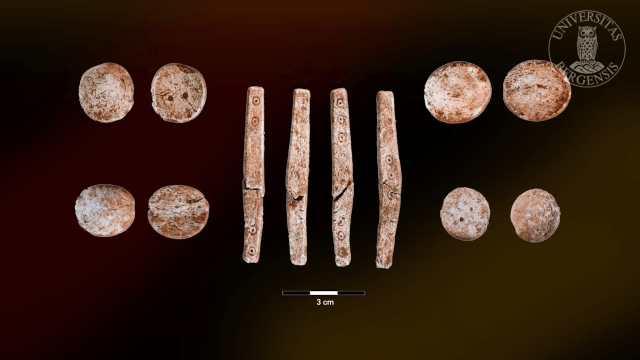A 1,700-year-old board game, including rare elongated dice, dating back to the Roman Iron Age has been unearthed in Norway. Found near an important sea route, the game was likely used to forge relationships among long-distance traders.
A total of 18 distinct playing pieces, similar to chips used in checkers, were found in a circular pit at the Ytre Fosse site in western Norway, according to a press release put out by the University of Bergen. The pit was filled with black, greasy charcoal, within which archaeologists found a number of charred items, including bits of bone, pottery jars, a bronze needle, and some burnt glass. Taken together, this is evidence of a cremation pit, in which a high-ranking individual was burned in a bonfire while surrounded by these grave goods.
These items, including the playing pieces and four-sided dice, date back to around 300 CE and the Roman Iron Age. Morten Ramstad from University Museum of Bergen said his team was able to recover most of the set, as reported by NRK.
“Findings of playing pieces from the Late Iron Age are very rare both in Norway and in the rest of Scandinavia,” according to the press release. “The chips and the dice have belonged to a board game inspired by the Roman game Ludus latrunculorum, and the owner was probably a high-ranking person who belonged to [an elite regional tribe].”
Ludus latrunculorum, like other ancient Roman games, was similar to chess and backgammon. This game became popular among the Germanic peoples, eventually spreading farther north to Scandinavia, according to NRK. The dice are marked with point circles representing values of zero, three, four, and five.
Ytre Fosse is in an important geographical location near the Alverstraumen straight. During the Iron Age, this was a significant sea route linking northern Norway to southern Scandinavia and continental Europe. As a fun fact, the sea route was called Nordvegen, which means “the northern way,” and has since become the official name of the nation: Norway.
The presence of a board game within a cremation pit near the Alverstraumen straight points to the special status of the individual cremated at the site.
Speaking to NRK, Ramstad said the grave goods are “status objects that testify to contact with the Roman Empire, where they liked to enjoy themselves with board games.” People who played these types of games “were local aristocracy or upper class,” and the ability to play such games “showed that you had the time, the profits, and the ability to think strategically,” explained Ramstad.
And as noted in the University of Bergen press release, people “who controlled the point along the shipping lane had power and political dominion in their local tribal areas,” adding that the “many and large burial mounds we find along Alversund are a testimony to a political landscape, over powerful groups that could tax goods and get tribute from those who sailed through the strait.”
Really fascinating stuff—and it reminds me of a modern analogue: potential business partners discussing matters over a game of golf.
The items found at Ytre Fosse are currently being preserved, after which time they’ll likely be put on public display at a local museum.

Leave a Reply